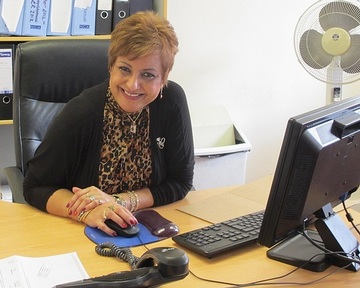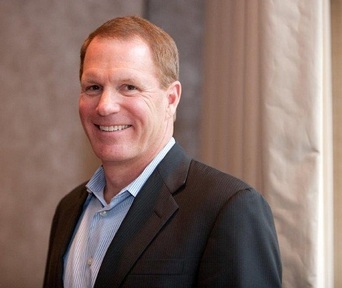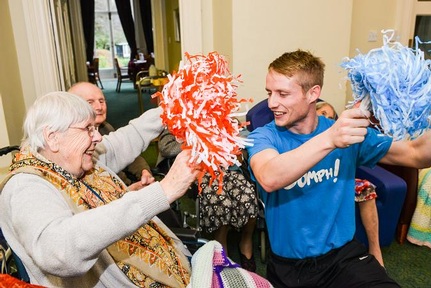Profile: Social care campaigner Martin Green says "making a difference is all about changing policy"
For Martin Green, a tireless social care campaigner and chief executive of , making a difference is all about changing policy.
“If you can change policy you can make a difference to everybody and I am really interested in effecting change for everyone,” he says.

Mr Green likes to fight for the underdog and so it is no surprise that he has always been interested in older people’s issues.
“Older people really suffer as they are at the bottom of the pile. It is societal prejudice. The charities that get the most donations are children’s charities and animal charities. It is naked ageism. Why is it that a child with autism receives more funding than an older person with dementia?”
However, he concedes attitudes are changing and it is getting better. He attributes a lot of the change to Baroness Greengross who “has made a big difference and has really helped to change people’s perceptions of older people.”
His first job was working as a policy offer for the single parents’ charity, Gingerbread. After that he had an extensive career in NGO development both in the UK and nationally. He has held a long list of eminent job titles including being chief executive of five British charities, vice-chair of the International Longevity Centre and a trustee of the National Aids Trust.
In 2012, in his role as Department of Health Independent Sector Dementia Champion, he led the development of the Dementia Care and Support Compact for the Prime Minister's Challenge on Dementia. In 2008 he was named Care Personality of the Year and was awarded an OBE for services to social care in the 2012 Queen's Birthday Honours List.
Mr Green is currently chief executive of the English Community Care Association, the largest representative body for independent social care services in the UK.
Yet when asked what he is most proud of in his career, it is not accolades and job titles.
It is “developing some work cooperatives for people with HIV in Uganda in 1990-1993. Uganda was the first country in Africa to acknowledge it had a real problem with HIV. I was working for Unicef at the time. We worked with people to discover a niche in the market and we gave them funding to help set up their own business. One business was so successful they built a school and a medical centre from the proceeds. Sadly most of the people I worked with back then have died from AIDS.”
For him, the highlight of his career was when he was asked to write the Dementia Care and Support Compact, signed by leading care home and home care providers setting out their commitment to deliver high-quality relationship-based care and support for people with dementia.
He has been a dementia champion for the independent sector for two years and is really pleased that “the issue of dementia is being recognised by the Prime Minister”.
“I feel we have made a difference. Dementia is now centre stage and it is the first time a prime minister has acknowledged that it is a problem that needs to be addressed,” he says.

As chief executive of ECCA, Mr Green has been doing his utmost to raise awareness of how underfunded care is.
The government says there is no money in the system for social care but he believes he has the solution.
“They need to shift it out of health and into social care. Politicians are very bad at decommissioning services. There are lots of people with dementia in acute hospitals and a lot of these interventions could be done in care homes if the staff there were skilled up to deal with them. I would like to see primary care getting more involved,” he says.
He would also like to see local authorities using the cost for care exercise that was developed by the Joseph Rowntree Foundation and Laing and Buisson.
The report found local authorities are paying fees to care home providers that are not meeting the costs of care and revealed fees have dropped by 3.9 per cent over the last two years. The report called on local authorities to raise their fees by between five and eight per cent for the next three years, an increase of up to £41 per person per week.
It also recommended rewarding quality care by paying higher fees to care homes showing higher standards.
Mr Green is a supporter of Andrew Dilnot’s ideas and would like to see social care costs capped so people do not lose large chunks of their assets.
However he says: “They are not the whole answer to getting more funding into the care home sector. We need to have a clear system in place and options like insurance.”
Despite the issue of funding, Mr Green remains very optimistic about the future of care homes.
He believes the care homes sector has a very bright future and says: “In the future, I think care homes will be the hub for people who have dementia and they will offer a whole range of services for people with long-term conditions. There will be more diversity in the types of care homes and there will be more community living and medical services on site. We need to be able to give people more choice of where they can live. We need to have over capacity and lots of diversity in the sector. We have to stop local authorities commissioning care and we need to let people commission their own care.”
Currently, there is a trend towards keeping people in their own homes as long as possible in accordance with the often quoted mantra ‘I want to stay in my own home’.
However Mr Green believes this path is not always the right one. “Homecare is good if it is appropriate but if you take people with very severe needs and only give them 15 minutes care in the morning and 15 minutes care in the evening, then it is not. I remember talking to one lady who had moved from her own home to a care home and she said ‘my front door was my prison’ and she said she didn’t have any independence.
“Independence is not down to your geographical location. It is a state of feeling. We should not focus on the mantra about everybody wanting to live in their own home. I am sure they do if they can manage on their own but if they can’t it is miserable. People ask me now if I want to live in a care home and I say no but if they ask me when I am 90, I may give them a very different answer,” he says.
More training for staff is often cited as the solution to stopping the abuse that has been exposed at various care homes over the last few years, however Mr Green believes qualifications are not the answer. He says: “We do need to have professionals that are properly trained and properly paid, however training is not the key to preventing abuse as huge amounts of abuse have taken place in hospital by trained nurses. These nurses are well trained and fairly well paid and they are still committing abuse.”
“We need people working in care home who are judged on their values not on their qualifications. We need to have a clear set of values for people working in social care.”
A lot of care homes in the independent sector already assess people by their values when they are recruiting, according to Mr Green.
“It is the public sector which spends the most on training which hasn’t got it right yet,” he says.
Interesting facts
First job in social care: policy officer for Gingerbread, single parents’ charity
Favourite book: Cold Comfort Farm by Stella Gibbons
Favourite film: Kind Hearts and Coronets
Favourite piece of music: Zadok the Priest by Handel
What is the best present you have received: A pair of English Setters from my parents
Last holiday: Portugal
Latest Profiles News
 05-Sep-16
Being chief executive of a care home provider is a 'huge responsibility and privilege'
05-Sep-16
Being chief executive of a care home provider is a 'huge responsibility and privilege'
 31-Mar-15
Profile: 'Both local and national Government needs to put its money where its mouth is,' says chair of the National Care Association
31-Mar-15
Profile: 'Both local and national Government needs to put its money where its mouth is,' says chair of the National Care Association
 16-Dec-14
Profile: Care home turnaround specialist reveals some of the tricks of the trade
16-Dec-14
Profile: Care home turnaround specialist reveals some of the tricks of the trade
 01-Dec-14
Profile: ‘People should not be dreading going into a care home – they should be looking forward to it,’ says care home boss
01-Dec-14
Profile: ‘People should not be dreading going into a care home – they should be looking forward to it,’ says care home boss
 07-Oct-14
Exercise is key to 'changing the care sector' says provider of exercise therapy in care homes
07-Oct-14
Exercise is key to 'changing the care sector' says provider of exercise therapy in care homes